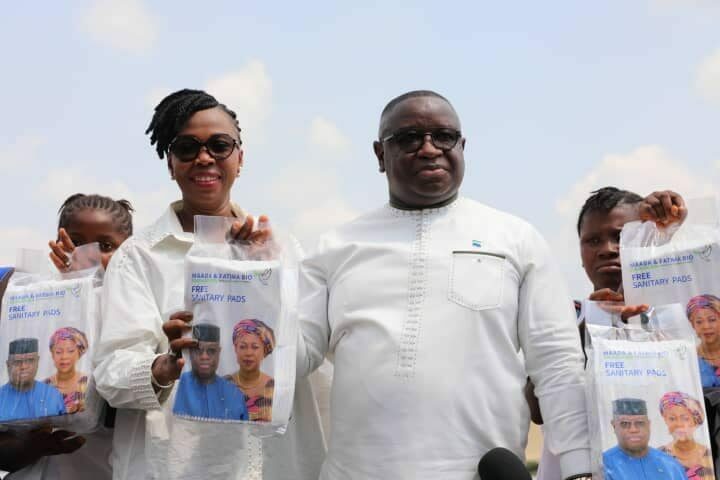The stadium incident in Bo this week, involving girls who went to collect free menstrual pads handed to them by President and Ms. Bio, was very unfortunate. It is our hope that the children get well, and very soon. We do not want to dwell on the incident at a time when the girls and their families are dealing with the horror that it was. It is, however, an opportunity to scrutinise what we would like to call “padded philanthro-politics” by the first couple.
Since they came to power in 2018, President Julius Maada Bio and his wife, Fatima have (from time to time) been handing out free menstrual pads to schoolgirls around the country. In a society that has girls missing school and facing all sorts of social barriers due to period-poverty, this is an initiative that makes a lot of sense to many people. We do not know the exact number, but hundreds, if not thousands of girls have benefitted from free menstrual pads from the Maada and Fatima Bio Foundation. But beyond the couple’s generosity, and the huge publicity that usually comes with the handouts lies a series of questions that make the whole project quite problematic: dignity, impact and sustainability and transparency.
On a lighter note, there is a genuinely funny aspect to the menstrual pad donations by the first couple. We are probably the only ones who do not get it (or maybe not), but it is funny that people would make the interesting decision of having their photos on the packaging of menstrual pads. We are probably the only ones who find this funny, but that is actually where the fun stops. The rest of the issues are quite serious.
For a very long time, menstruation has been portrayed as an unclean time of the month that women and girls should be ashamed of, while the rest of society either murmur about it or do not talk about it at all. This has contributed to what is today a very uninformed and largely negative attitude towards menstruation. So, the whole point of making menstruation kits accessible to girls is about basic human dignity. That is why when Mr. President and Madam First Lady show up at a packed stadium, addressing young girls and handing them pads, you begin to ask whether this is really about girls or about the givers. Girls do not have to come to a stadium and endure the heat to receive a few pads which they or their parents would have afforded if their lives were better. The children of the well-to-do do not have to queue up in the sun to receive menstrual pads. In our view, this mass distribution model undermines the girls’ very dignity.
Before they moved on to the stadium-style mass distribution, the First Lady gathered students at schools. Smaller scale, similar model. The girls stood out in the sun as they collected parcels of menstruation pads with photos of Mr. President and Madam First Lady on them.

The next point of our query is what seems like a lack of strategy. Thousands of girls receiving free pads may seem like a big number. But the issue with that is what happens after that. Girls who cannot afford pads would either have to go back to their good old pieces of cloth or struggle to keep up with a lifestyle that was flashed at them. What is the strategy? Do we keep handing out pads once in a while or can the government be sincere about its approach to period poverty? Handing out pads to schoolgirls once every year or so is not a solution. It has been almost five years since this government came to power—enough time to have thought about a sustainable approach to tackling period poverty. Enough time to have legislated it. There are many countries in Africa that are moving towards free menstrual pads for schoolgirls. Kenya, South Africa, Botswana and others are actually delivering it. Some of these countries have legislated this, securing it and making sure that regardless of the government that is in power, the State has to allocate funds. Well, let us say Sierra Leone is too poor and there are competing priorities. Another approach could be waiving all taxes on menstruation products. Call it a subsidy, but this could provide the basis for the regulation of prices around menstrual kits.
And there is the question of transparency around the project. We are made to believe that this is an initiative of the Maada and Bio Foundation, a charity registered in the United Kingdom (Charity Number 1154091) with a reporting that is overdue by close to 750 days, according to the UK charities register. They have been handing out period pads to schoolgirls and feeding children from time to time. That is all we know. We do not know who the donors are. We do not know how much of the donations they receive come in pads or cash and the financial records as reported in the UK remain too scanty and outdated to provide any helpful information. For a charity that the President and First Lady run, you would expect that its books were up to date and their dealings as transparent as possible.
What we read from the distribution of pads is a certain type of philanthro-politics that strips girls of their dignity, instead of protecting it; and the lack of a clear strategy to tackle period poverty supports the view that this may be a little about the girls and a lot about personality and political expediency. That is not how to fight period poverty. In five years, there is a lot more that could have happened on this front than handing menstrual pads to girls every once in a while.
Whatever you are up to this weekend, find a sincerely good cause that tackles period poverty and support it.
About The Author
- Engage Salonehttps://www.engagesalone.org/author/eng21_admin/
- Engage Salonehttps://www.engagesalone.org/author/eng21_admin/
- Engage Salonehttps://www.engagesalone.org/author/eng21_admin/
- Engage Salonehttps://www.engagesalone.org/author/eng21_admin/


